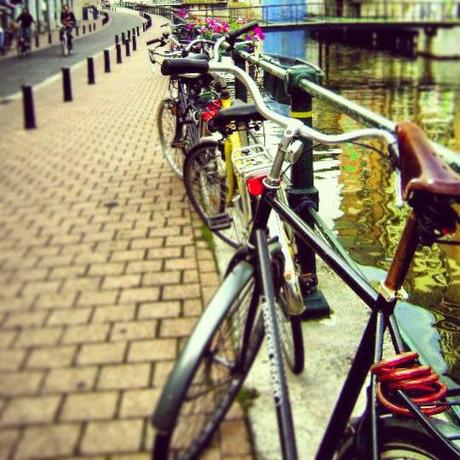It’s hard as an American living abroad to not always compare Belgium to my home country or vice versa. I try not to present things too much in this way on the blog because often when comparisons are made people make an assumption that one way is better than the other. The truth is, all the experiences in my life are placed on a backdrop next to what I once learned to be the norm. I find things interesting now because they are different, but I want to be clear in saying that the differences are neither entirely positive or negative – they are just anders. So, without further ado, I give you five major differences between the way of life here in Belgium and my former way of life in the US:
1. Transportation. Yes, how people get around is entirely different. First we should look at Belgium on a large scale. It is a small country with a surface area of 30,528 km2. Let’s put this into perspective: Kansas, my home state, has a surface area of 213,096 km2. Additionally, Belgium has a much higher population, coming in at 11.02 million, while Kansas has a population of 2.886 million. The entire country of Belgium is about the size of the US state of Maryland (source). With a high population and a smaller surface area, the people have adapted to meet transportation needs.
- Cars are much smaller (which is consistent throughout Europe). A rich expanse of history combined with protected architecture can make navigating small old streets and locating parking spaces a bit tricky. The roads are not American-sized and the cars here make even the average American SUV look like a monster truck.
- One of the most essential modes of transportation for the average Belgian is a bicycle. Bikes are everywhere (literally everywhere!) and are much more convenient when getting around in the city. As a woman I find it delightful; I can wear whatever shoes I like and not have to worry about acquiring blisters or aching feet after an hour of walking around the city. A parking spot for the bike is more easily located than a spot for a car (although the bike racks at the university are sometimes very overcrowded) and one more plus point, parking spots for the bike are free while in many places in the city center you have to pay to park your car.

- Public transportation is readily available and widely used. In the city of Ghent we have buses and trams that allow one to easily reach any destination in the city. If your destination is outside of Ghent then you can just as easily hop on the train and arrive anywhere you please within Belgium in a very short time (remember, Belgium’s small!).
2. Condiments. Since moving to Belgium I’ve not only been introduced to many new foods but also many new ways of eating old foods. Belgians are crazy about mayonnaise. They eat it on so many things. The quintessential Belgian food, fries (don’t call them french fries – unless you want to hear why they are not supposed to be called french fries), is just not complete without a(n) (un)healthy-sized dollop of mayonnaise on top. That’s not all, though. If you want to see the wide array of condiments just walk on into a fry shop and prepare to be amazed. Another popular fry condiment is curry ketchup. It’s a lot like regular ketchup but with a little extra curry taste. There are also other kinds of sauces that I could have never imagined before – joppiesaus, a sort of sweet yellow sauce; bicky saus a similar tangy yellow/orange sauce; and many many others. Curious to see more options, check out the menu from this Belgian frituur, there are 26 cold sauces alone, not even counting the warm ones.
3. Education. As serious as Belgians are about fries and the stuff they put on them, they are even more serious about education. I wrote a rather long post about my experience so far studying at a Flemish university so I won’t go into too much detail about that now (read the post here if you’re interested), but I will just say that it is hard. The level is much higher than any level I’ve ever been exposed to. I was always quite a good student growing up. I was fortunate to be one of the kids that rarely had to study. A good attention span and an affinity for reading and writing allowed me to go through the American education system with little difficulty (mathematics was something else, though). I completed my entire American bachelor’s degree with only a few restless nights of studying and with quite high scores. Comparing my American experience with my Flemish experience so far provides a very stark contrast. It’s the hardest thing I’ve ever done academically up to this point and I’m quite certain even more challenging academic obstacles are to come on this educational journey.
4. Beverages. Alcohol is treated very differently here in Belgium, I wrote about that here, but that’s not the only beverage that is done differently.

5. Speeding. Granted, there is a lot of speeding that happens on the US interstates and highways, but there is also always the possibility that you will be caught and fined. I think I can honestly say that in the two years (yes, two years now!) that I’ve lived in Belgium I have never seen someone pulled over for breaking the speed limit. In fact, I can say that I’ve never seen anyone pulled over for any sort of traffic violation. It seems to me that the Belgian highways are very unregulated and this often leaves me with an unsettled feeling. It is a daily occurrence to be driving down the road and have a car speeding past you on the left-hand side. This extreme in combination with the slow-paced merging traffic coming from the right-hand lane creates an environment that seems very potentially dangerous to this American (who is undoubtedly very accustomed to strictly abiding by traffic laws). I’ll be frank and say I don’t like this. I have little tolerance for other people taking my life into their own hands and I think this is really something that should be dealt with in Belgium. Financial problems? Well… whenever one of those Audis or BMWs speeds by, I see a lot of extra money waiting to be had if only they would be fined for breaking the law instead of just allowed to do so.
What are your thoughts? Any expats want to add to the list? Any Americans convinced that they will now move to Belgium to enjoy public transportation, an array of condiments and attempt to try all the Belgian beers?

